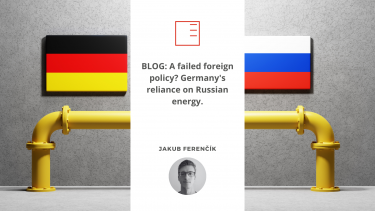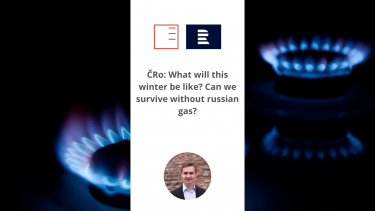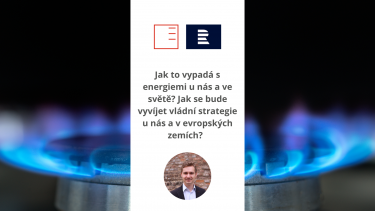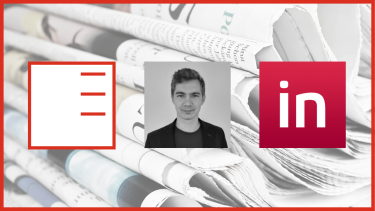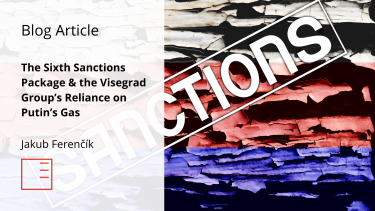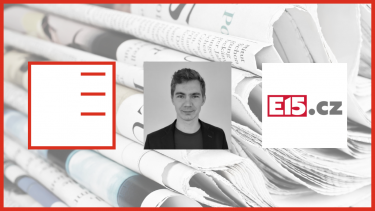BLOG: A failed foreign policy? Germany's reliance on Russian energy.
Jakub Ferenčík has written a blog on German dependence on Russian gas. In his post he discusses how the German government's initially positive intention to tie Russia to Europe through economic intergation for political stability has backfired and resulted in the opposite. It mentions the role of former Chancellor Gerhard Schröder, who contributed significantly to Germany's dependence on Russian supplies, and the circumstances surrounding the construction of the Nord Stream 2 pipeline. The second part analyses the legacy of former Chancellor Merkel and her failure to perceive Russian expansionist tendencies.
Show more
BLOG: A failed foreign policy? Germany's reliance on Russian energy.
Jakub Ferenčík napsal blog na téma německé závislosti na ruském plynu. V příspěvku rozebírá, že původně pozitivní záměr německé vlády, tedy skrze ekonomickou integraci připoutat Rusko k Evropě za účelem politické stability, se Evropě vymstil a vyústil v pravý opak. Zmiňuje roli bývalého kancléře Gerharda Schrödera, který výrazně přispěl k německé závislosti na dodávkách z Ruska, a okolnosti spojené s výstavbou plynovodu Nord Stream 2. V druhé části pak analyzuje odkaz bývalé kancléřky Merkelové a její selhání vnímat ruské expanzionistické tendence.
Show more
ČRo: What will this winter be like? Can we survive without russian gas?
The Czech Republic is not saving enough natural gas. Last year was above average in terms of gas consumption. Moreover, the country is slowly getting into a situation where it is drawing more from its reserves and storing less. How will the Czech Republic cope with the heating season? Our researcher Michal Hrubý commented on the topic of natural gas for Czech Radio.
Show moreČRo: What is the energy situation in our country and in the world? How will the government strategy evolve here and in European countries? What about the world
The International Energy Agency said in its quarterly report that Europe will face unprecedented risks regarding Russian supplies and may be forced to compete with Asia for liquefied natural gas. Our research fellow Michal Hrubý discussed the European situation, including the Czech situation in this global context, with Martina Mašková.
Show moreiRozhlas: EU energy milestones: covid, green alternative, Russian attack and the search for consensus
iROZHLAS has prepared an overview of the energy measures discussed by the European Union in the context of the energy crisis. The review shows that the EU's securing of the energy market is not in line with the actions taken by national states. This inconsistency was also commented on by our researcher Michal Hrubý, who pointed to the need to proceed to a comprehensive solution at the level of the European Commission.
Show moreRTVS: Some EU countries are returning to coal energy
The return of coal as a source of electricity production is a direct consequence of the Russian aggression in Ukraine. The resumption of coal-fired power stations in Europe means an increase in harmful emissions, jeopardizing the EU's climate targets. EUROPEUM Institute researcher Kateřina Davidová spoke in detail about the energy crisis in Europe, the measures that Brussels is taking to prevent countries from turning to sources of electricity such as coal, and the compensatory measures taken by member states.
Show more
Novinky.cz: Analysis: How to survive the winter without Russian gas
How do we manage energy in the Czech Republic? What will be the energy situation in the future and how can we save? Our Research Fellow Michal Hrubý commented on this for the news server Novinky.cz.
Show moreBLOG: The Sixth Sanctions Package & the Visegrad Group’s Reliance on Putin’s Gas
Jakub Ferenčík wrote a blog on the current topic: The Sixth Sanctions Package & the Visegrad Group’s Reliance on Putin’s Gas. Russia's aggression in Ukraine has necessitated another package of sanctions, this time in the energy sector. Due to the lack of alternatives for gas supplies, the Visegrad Four countries had a problem with the implementation of the latest sanctions package. In the end, the EU found a consensus and introduced exemptions for the Czech Republic, Slovakia and Hungary.
Show more PDF
E15.cz: Europe's disconnection from Russian energy as a signal
Our research fellow Michal Hrubý commented for E15.cz on the preparation of the sixth package of anti-Russian sanctions. Michal Hrubý sees the situation as a clear signal to promote nuclear energy and renewable sources, while the extraction of own raw materials will be inevitable.
Show moreINVITATION: Implications of the Russian Invasion of Ukraine for the Western Balkans: Challenges and Options for the Czech Presidency
The EUROPEUM Institute for European Policy, the Balkans Policy Advisory Group (BiEPAG) and the European Fund for the Balkans (EFB) invite you to a public conference on the Balkans and its politics at the event entitled: Consequences of the Russian Invasion of Ukraine for the Western Balkans: Challenges and Opportunities for the Czech Presidency. The debate will take place on 11 May 2022 at 18:30 at Impact Hub K10, Koperníkova 10, Prague 2 - Vinohrady, 120 00.
Show more PDFStaroměstské náměstí 4/1
Prague 1 - Staré Město
110 00
tel.: +420 212 246 552
email: europeum@europeum.org
https://www.europeum.org
